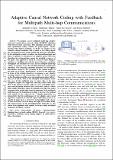Adaptive Causal Network Coding with Feedback for Multipath Multi-hop Communications
Author(s)
Cohen, Alejandro; Thiran, Guillaume; Bracha, Vered Bar; Medard, Muriel
DownloadAccepted version (6.159Mb)
Open Access Policy
Open Access Policy
Creative Commons Attribution-Noncommercial-Share Alike
Terms of use
Metadata
Show full item recordAbstract
© 1972-2012 IEEE. We propose a novel multipath multi-hop adaptive and causal random linear network coding (AC-RLNC) algorithm with forward error correction. This algorithm generalizes our joint optimization coding solution for point-to-point communication with delayed feedback. AC-RLNC is adaptive to the estimated channel condition, and is causal, as the coding adjusts the retransmission rates using a priori and posteriori algorithms. In the multipath network, to achieve the desired throughput and delay, we propose to incorporate an adaptive packet allocation algorithm for retransmission, across the available resources of the paths. This approach is based on a discrete water filling algorithm, i.e., bit-filling, but, with two desired objectives, maximize throughput and minimize the delay. In the multipath multi-hop setting, we propose a new decentralized balancing optimization algorithm. This balancing algorithm minimizes the throughput degradation, caused by the variations in the channel quality of the paths at each hop. Furthermore, to increase the efficiency, in terms of the desired objectives, we propose a new selective recoding method at the intermediate nodes. We derive bounds on the throughput and the mean and maximum in-order delivery delay of AC-RLNC, both in the multipath and multipath multi-hop case. In the multipath case, we prove that in the non-asymptotic regime, the suggested code may achieve more than 90% of the channel capacity with zero error probability under mean and maximum in-order delay constraints, namely a mean delay smaller than three times the optimal genie-aided one and a maximum delay within eight times the optimum. In the multipath multi-hop case, the balancing procedure is proven to be optimal with regards to the achieved rate. Through simulations, we demonstrate that the performance of our adaptive and causal approach, compared to selective repeat (SR)-ARQ protocol, is capable of gains up to a factor two in throughput and a factor of more than three in mean delay and eight in maximum delay. The improvements on the throughput delay trade-off are also shown to be significant with regards to the previously developed singlepath AC-RLNC solution.
Date issued
2020Department
Massachusetts Institute of Technology. Research Laboratory of ElectronicsJournal
IEEE Transactions on Communications
Publisher
Institute of Electrical and Electronics Engineers (IEEE)
Citation
Cohen, Alejandro, Thiran, Guillaume, Bracha, Vered Bar and Medard, Muriel. 2020. "Adaptive Causal Network Coding with Feedback for Multipath Multi-hop Communications." IEEE Transactions on Communications, 69 (2).
Version: Author's final manuscript